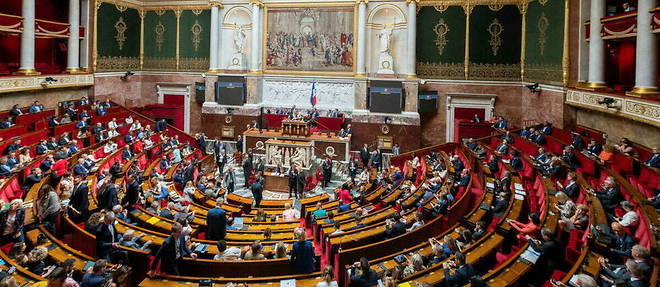Insubordinate France brandished the threat as soon as the legislative elections were over. Faced with the Prime Minister’s refusal to pledge the confidence of her government before the National Assembly following her general policy statement this Wednesday, July 6, the Nupes intergroup ended up rallying behind the idea and heavy artillery. A motion of censure will be tabled at the beginning of the afternoon to, says Mathilde Panot, president of the LFI group, “bring [Élisabeth Borne] before Parliament”.
The motion of censure is the fatal weapon of the deputies. Provided for by article 49 of the Constitution, it allows the lower house of Parliament to overthrow the government. The government can itself engage its responsibility by passing a text without a vote, the deputies then having 48 hours to oppose it by tabling a motion of censure – it is the famous “49.3” – or the latter can file one spontaneously, which is the case here.
Article 49.2 of the Constitution thus provides that “the National Assembly calls into question the responsibility of the government by the vote of a motion of censure”, which must be tabled by at least 10% of the deputies, i.e. 58. In the opposition, only Les Républicains (62 elected), the National Rally (89) and La France insoumise (75), or even the other Nupes groups if they manage to reach an agreement in intergroup, are able to brandish this threat.
The left-wing coalition therefore plans to table its motion of censure at 2:30 p.m., a few minutes before Elisabeth Borne’s general policy statement. The text sets out, in general, the political orientation desired by those who tabled it and the reasons for their opposition to the government’s roadmap. It is therefore difficult to agree right and left on the text. Once submitted, the Conference of Presidents sets the date for the vote, after a minimum period of 48 hours. The vote will therefore not take place before, at best, Friday afternoon, July 8.
To be adopted, the motion of censure must receive an absolute majority, i.e. 289 votes. This is where it gets tricky: Nupes alone has only 151 members. We would have to convince LR and RN to vote for the text, but they have already warned that they would not follow. Annie Genevard, interim president of LR, affirmed on BFM that her party is “a responsible formation which will not [engage] in this way”, when Sébastien Chenu, vice-president (RN) of the Assembly, launched on RTL that his group is “not there to block everything, break everything”.
Within the Nupes itself, the debate raged, some being more cautious, like Valérie Rabault. On LCP and Public Sénat, the Vice-President (PS) of the Assembly warned: “We must always be careful with motions of censure, because, when they are not voted on, de facto, they give legitimacy to the government in square. The Constitution also provides that “only the votes in favor of the motion of censure are counted”. No difference is thus made between those who rejected the motion in support of the government and those who simply abstained.
The spontaneous motion of censure of the Nupes will be the 59th tabled under the Fifth Republic. So far, only one has been adopted. It was in October 1962: the deputies, opposed to the election of the President of the Republic by direct universal suffrage wanted by General de Gaulle, overthrew Prime Minister Georges Pompidou and his government.


















